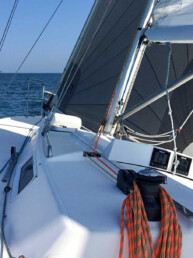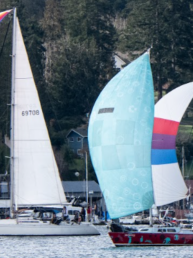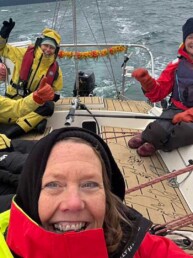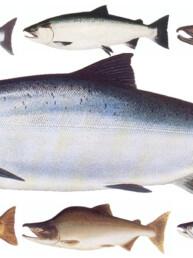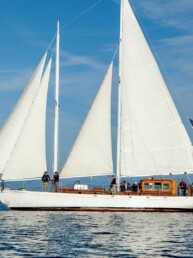Skipper Jenn discusses important stories and ideas shared during US Sailing’s Panel with LGBTQ sailors, as well as her own experiences.
I was a bit shocked and a lot thrilled to hear that there would be a US Sailing LGBTQ (Lesbian, Gay, Bisexual, Transgender, Queer) DEI panel (Diversity, Equity, and Inclusion).
I have seen how homophobia, transphobia and biphobia play out in the sailing world firsthand. As a gender non-conforming bisexual cis woman in a relationship with a man, I am never gay enough and never straight enough. Bisexual folks live in an in-between space — getting questioned about our identity by both the straight and the queer community. We have straight-passing privilege, but there is always a component of not belonging because of bi-erasure.
Some folks get put off by the acronyms and terms in the queer world today. This discomfort or confusion is an invitation to explore experiences and identity outside of your own and extend support to folks who feel marginalized. Using the terms, pronouns, and labels people request is an important part of queer advocacy, especially for the generation coming of age now.
With interest and excitement, I tuned into the panel discussion to hear others’ experiences, insights, and ideas. As it got started, I laughed out loud when moderator Kimball Livingston said he was a heterosexual OWG, “Old White Guy.” I think it was a humorous way to call out the fact that sailing is indeed very white, very male, very heterosexual, and skews toward an older generation. We need these panels to help grow our sport, quantitatively and qualitatively.

The panel consisted of Francesca Clapich, a two time Olympian and 49erFX World Champion who just married Sally Barkow, the US Sailing Olympic Team Coach and Performance Manager; Stephanie Helms, President of the Northeast Sailing Association who was supported by her sailing community when she came out as transgender later in life; John DeRuff, the two-year captain of the George Washington University Sailing Team, who came out publicly only very recently; and Liam Fuadree, Junior Sailing Director of the Rochester Yacht Club who runs many youth sailing programs and is happily married to his husband.
Each gave touching examples of the stories and struggles of coming out and feeling alone in a heteronormative world. Stephanie did a great job explaining that sexual orientation and gender is about identity, and it is something that starts at an early age. She emphasized listening to youth on who they say they are and give respect to that.
As a mental health counselor who works with LGBTQ youth, I understand firsthand the studies that show how trans youth who are listened to and allowed to express their gender identity sooner are less likely to experience gender dysphoria and mental illness, and have lower suicide rates. Gay, lesbian, and bi youth who come out and are received with acceptance show the same trend in their well-being. Queer youth who are bullied or rejected, tragically, have higher rates of mental illness and suicide than any other population of people.
With trans folks like Stephanie, there is a common misconception and confusion that biological sex and gender need to be the same. This is not always true. For some folks, with “cis” in front of their gender, they match up. For some folks, with “trans” in front of their gender, they don’t. Some trans folks want to and do change their biology to be more congruent, some don’t. Your sexual organs are not what make you a man or a woman. There are folks who do not adhere to either of these binaries and are gender fluid or non-binary. And there are intersex folks, who are biologically non binary, and are leading the way in seeing that neither sex nor gender are a binary. To me, it is exciting that we don’t have just two boxes to check anymore. It gives us all much more freedom to express and identify in ways that feel authentic and true to who we are. Gendering activities like cooking or working on an engine is weird and arbitrary.
Francesca spoke of the loneliness she felt in sailing when she was younger. She was always asking, “Am I alone, is there anyone else out there like me?” She spoke of how having an environment where people can safely be out in sailing will give an opportunity for queer folks to find one another and avoid that feeling of isolation. Belonging is essential to human health and thriving—we need diversely representative spaces and we also need spaces for folks who share common experiences to gather in sanctuary. Francesca talked about the need to have invitations for ALL kinds of kids to join the sport. Liam further emphasized this by saying how it is important to have role models in sailing, especially in coaching and mentorship roles. This way LGBTQ youth have someone like them to look up to, and heterosexual youth understand that being gay is something totally normal. He seems to exemplify this in his work in sailing.
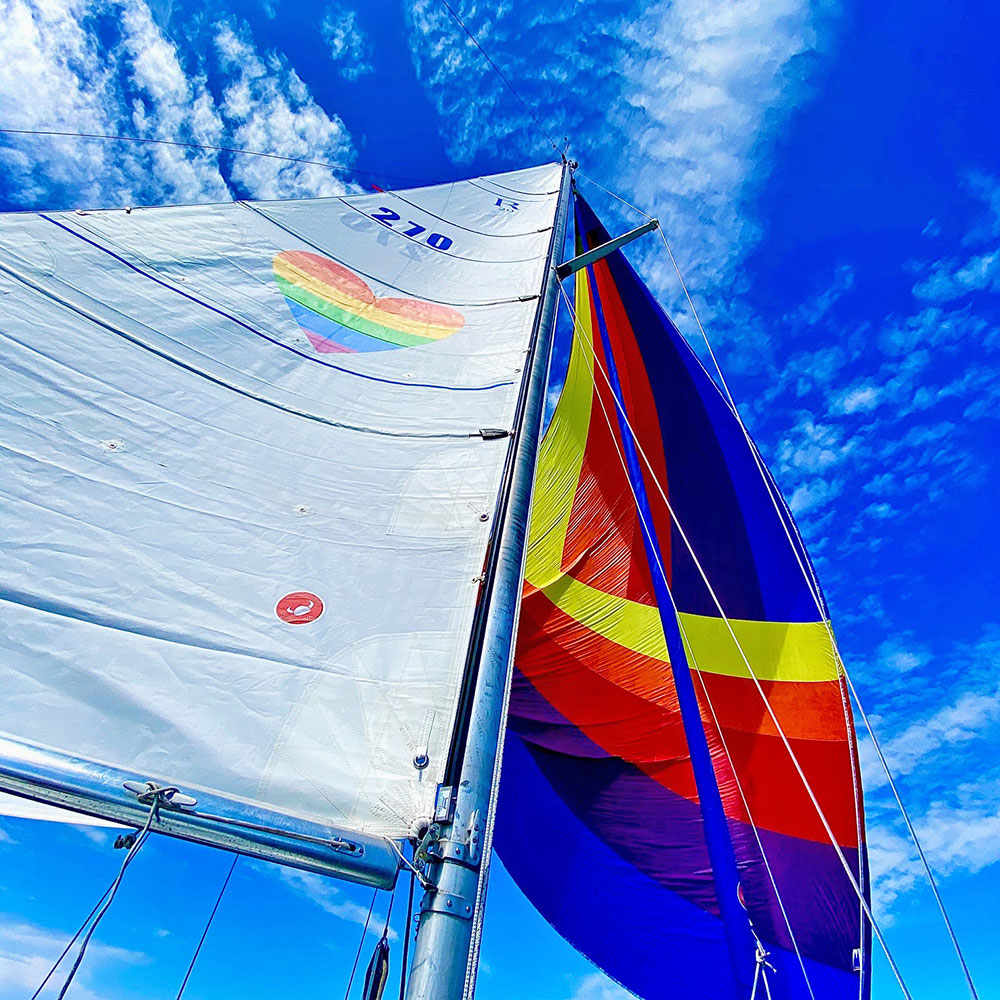
John went over stats that show only 24% of LGBTQ youth play a sport, compared to 75% of heterosexual youth. Out of that 24% of queer kids playing sports, 80% of them are not out to any of their coaches. The drop-out rate is two times higher than straight youth. We need to do better, but as John said on the topic, “Sailing has an opportunity…. With our largely non-gendered structure particularly through youth sailing, we’re already a big step in the right direction on how we can include all people and make sure that all young sailors feel accepted.” Part of that is the invitation and modeling mentioned above, and part is about policy and training. Francesca discussed how we need leadership to create more safety for LGBTQ youth to prevent bullying and create inclusion, setting the tone from the top. I agree that this all needs to be put clearly into writing and practice in organizations, clubs, and events.
John shared that many of his fellow sailors are not comfortable being out. It would be a risk to their social and performance standing in the sailing community. He explained how in some races there have been homophobic name-calling and taunts from other boats when they know a gay crew member is on board. Stephanie made the point that this violates rule #2 and #69 of the race rules. Both rules are about sportsmanship and Stephanie said essentially boil down to, “Don’t be a jerk.” This made me think of when sailors have made gender slurs toward my all women’s team. I like to talk some friendly smack in a race, or play small jokes like bio-glitter in a spinnaker, or toilet paper strung throughout the rigging, but slurs of any kind are unacceptable and definitely go against the respect due to any sailor on the water. I haven’t ever protested sexist comments because no one wants to be the “snowflake” complaining, or worse. I try to stay focused on the race, but it’s not easy. This is another reason it’s so important for leadership to step in and call this behavior out. For folks who are being bullied, it is distracting on the course, and not always safe to challenge.
Toward the end, John said he wanted to assure folks that “…the gays are not coming for you.” This is in reference to a common homophobic perception that gay folks try to turn people gay. I was glad he said it and sad he had to say it. If you take nothing else from this write-up, please know this: people are born gay, it is not a choice. Being LGBTQ is part of your identity. It comes as part of the package of your human experience, it is not something you decide. No one decides to be heterosexual or cisgender, and it’s the same for queer and trans folks. The difference is, as a cis-gender or heterosexual person, you are never expected to explain your identity to anyone because it is the social norm. Queer and trans people have to say something to be seen and understood, and it sucks.
To understand society’s evolving norms as well as the present lack of diversity in sailing, it helps to look at why sailing is like so many things that have been predominantly driven and by OWGs. Historically, white men have held the vast majority of wealth and leisure time for sport. This is due to systemic racism, sexism, and homophobia where one group of people have had more resources than the rest for a long time. Sailing has also been less diverse because traditionally there have been gigantic hurdles of bias and resistance to others entering the sport. These things add up to white male privilege, and I would love to see US Sailing do a DEI panel specifically on that topic — that would be amazing leadership modeling.
John eloquently said that he hopes sailing can commit to a future where ALL sailors are celebrated and respected for their accomplishments and able to be fully themselves aboard. I think this is possible, and discussions like this are part of the path forward. I want to give great thanks to the panelists for their candor and vulnerability. I related to much of the material and felt seen as a queer woman and hopeful for the future of sailing.
Here’s the full panel discussion video:
Jenn Harkness
Jenn Harkness is a human being, artist, coach, therapist, writer, friend, mermaid, student of life and lover of all shine and sparkle. She is excited to be the new Editor-in-Chief of the Women Who Sail Newsletter, facilitating the mission of amplifying women’s voices and creating a kinder world through the content. She owns Poop Deck, a Ranger 29, and avidly races and cruises in the beautiful waters of Puget Sound. You can follow her adventures and hopefully gain unique and sometimes hilarious insights about feminism, mental health, and sailing over at skipperjenn.com

